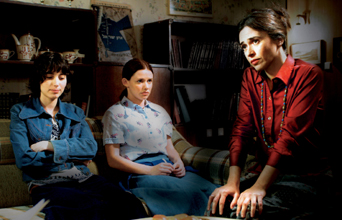Medurat Hashevet
Joseph Cedar
Israel 2004

|
" Delphi 10.02. 19.00 |
Produktion: Cinema Production, Israel Film Fund
Weltvertrieb: Cinema Production, 18 Ben Avigdor
St. P.O.B 57297, Tel Aviv 61572, Israel
Tel. (972-3) 561 70 40, Fax: 561 70 92
E-mail: cfactory@zahav.net.il
Buch: Joseph Cedar
Kamera: Ofer Inov
Schnitt: Einat Glaser Zarhin
Musik: Jonathan Bar-Giora
Darsteller: Michaela Eshet, Hani Furstenberg,
Maya Maron, Moshe Ivgy, Assi Dayan
Format: 35mm, 1:1.85, Farbe
Länge: 95 Minuten, 24 Bilder/Sek.
Sprache: Hebräisch
Campfire takes place in the year 1981 in Jerusalem. Rachel Gerlik, a 42-year-old widow and mother of two teenage daughters, wants to join the founding group of a new religious settlement in the West Bank. The problem is that the acceptance committee won’t accept her unless she remarries and proves to the committee that she and her daughters can meet the group’s religious and ideological standards. So while Rachel sets out to find a new husband, and to show the committee that she is idealistic enough, 18-year-old Esti, Rachel’s oldest daughter, does everything she can to ruin her mother’s reputation. Tami, the younger daughter, who is a little more sympathetic to her mother’s loneliness, tries to please her mother, but at a bonfire with some boys from her youth movement, she is raped and later accused of being flirtatious and promiscuous. When rumours about the incident with Tami spread throughout the neighbourhood, Rachel is forced to choose between hushing up the story, as the people from the settlement request of her, and fighting to save her daughter’s name. At the same time, Rachel falls in love with Yossi, a 50-year-old bachelor, who has already decided that living as an outcast is not as bad as it seems. Joseph Cedar: ”We first meet Rachel in the beginning of the film with a desperate need to belong to a community, or 'tribe', even if it means compromising her integrity, but by the end of the story Rachel finds the strength to stand alone. Sitting around the 'tribal campfire', in its metaphorical meaning, can be warm and cosy, but as Rachel finds out, when you get too close – it burns. I believe that examining the tribal aspect in Israeli reality is the key to understanding the larger conflicts in our region.”
Joseph Cedar, geb. 1968 in New York. Seit seinem sechsten Lebensjahr in Israel. Studium der Philosophie, Theatergeschichte und Filmregie. Spielfilme Hashesder / Time of Favor (2001), Campfire (2004).